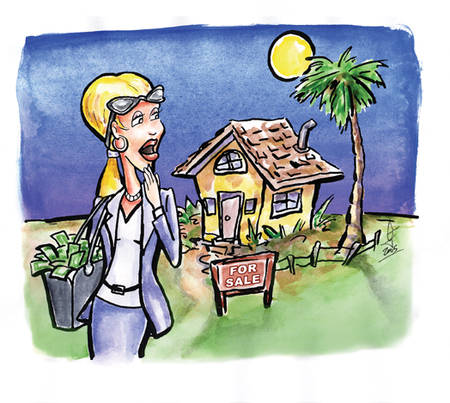Phoebe Wyoming | Illustration by Guy Junker
 I’ve rented since moving to Maui, but my landlords came to me last month with some ridiculous babble about “peroxide fumes” and asked me to hit the road. Clearly, it was time to purchase a home, but being dumped into Maui’s real estate market is like being dropped into the Pacific Ocean during hurricane season with nothing but a rubber-ducky tube.
I’ve rented since moving to Maui, but my landlords came to me last month with some ridiculous babble about “peroxide fumes” and asked me to hit the road. Clearly, it was time to purchase a home, but being dumped into Maui’s real estate market is like being dropped into the Pacific Ocean during hurricane season with nothing but a rubber-ducky tube.
I didn’t panic, as I personally know 682 folks in real estate on Maui. I simply opened my address book and pointed. I landed on my old friend Ayesha Belmonte, who is in the medical field and therefore would only be useful after I went into escrow. I tried a different tack, picking up the phone and randomly dialing numbers.
“Hope Springs Eternal Realty,” my dear, recently licensed friend Jimmy Rugburn answered fortuitously. We talked about what I might be looking for, and Jimmy cleared his throat a number of times, reminding me of a former analyst.
“You’ve been approved for half a million, but you may have to scale down your vision,” Jimmy said, trying to sound casual. “It may be something smaller, or a do-it-yourselfer.” For the first time that day, I felt a bit woozy.
I love Jimmy—he’s a caution—and we met Upcountry the next morning to begin viewing homes. We met at 8 a.m., Jimmy clutching a cup of coffee while I swilled from a Thermos full of Bloody Mauis. As I flounced into his car, Jimmy relocated a binder bursting with papers so I could sit.
“Gracious, you work fast,” I exclaimed. “There must be hundreds of houses to see today!”
“Ah, no, I’m sorry,” he measured out, plucking a wafer-thin folder from the binder. “We’ll be seeing just these two. There’s not a lot in your range.” I sat back and sipped dejectedly while we wound our way down to Hali‘imaile.
The first house was built in 1927 as a community center for plantation workers, and was huge, light, and full of fun architectural touches, like a tin roof (for drowning out tedious houseguests in the rainy winter) and a delicately flaky wood floor someone had lovingly restored with what appeared to be black Bubble Yum.
“There’s an actual bomb shelter under the backyard,” Jimmy enthused. “Almost 500 square feet, built in the ‘60s!”
“I can see why they’d need a backup.” I gagged politely, a colony of mites forming at the back of my throat. “How much, again?”
“In the high fives.” Jimmy whispered. “Perceived value.”
“Perceived value?” I asked worriedly, as it sounded threatening. “Has there been a telethon? Is Ellen involved?”
Jimmy didn’t know, and said the place was a flipper’s Paradise. I told him I felt like flipping someone, and he hurried us to the second destination.
We cruised down into the jungle of Ha‘iku next, into a gorge so breathtaking that I was forced to put my head between my legs. While I recovered, we parked in front of a massive mango tree that was dropping overripe fruit like rain onto the thick carpet of cuttings below. Jimmy cleared his throat.
“It’s lovely, really,” I offered tentatively. “Where’s the house? Am I looking at it?”
Helpfully, Jimmy and I were borne through the tangle of procreant palms by a cloud of effervescent fruit flies. We found ourselves deposited at a miniature house, almost like something I played with as a girl. It was immaculate, though, and came with a stream running just below the bedroom window. I turned, cracking my shin on an electrical outlet.
“My organ will never fit in here,” I moaned, something I think Jimmy already suspected. The 1952 Lowery Theatre model is a recurring source of much-needed income—and huge. The gravity of my situation suddenly hit me.
“There’s nothing else to see today?” I asked, a bit glassy-eyed and tremulous.
“Not today,”Jimmy answered quietly, and with one strong hand gave me a hopeful little backrub. “But we’ll keep looking.”
I thought about my Maui, about its deep impact on my being, about all my lovely and much-loved friends here, about my wonderful god-children, and I became my marvelous self again.
“Yes, we will,” I determined. As we got in the car to leave, I heard the satisfying splat of mushy mangoes bombarding the tiny roof.





